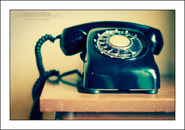 When you first start your Direct Care practice you may not know the answer to questions like "how do I want patients to reach out to me?" This means you can't teach them right off the bat because you don't know how you will want to communicate. So to start, here's what I do. When I meet with a new patient I explain that because of my family/work balance I am not always in the office but that I can be reached at any time. I emphasize that after hours for an extremely urgent issue only, calling is best so I don't miss it (but when they call they will hear a voicemail letting them know I respond to urgent voicemails back quickly but otherwise will return calls during business hours). Otherwise I tell them text or email is fine but if it's not urgent, email is the easiest way to reach me and it's their choice about using the private hipaa portal or regular/non-secure email. I explain that even though I'm not in the office 24/7 I can help handle most things remotely and help them determine when a visit might be clinically necessary. This sets patients up with the expectations that: (1) I am not a 24/7 Concierge Urgent Care Service of 1. (2) They can reach me when they need me...so anxiety about getting a hold of their doctor is unnecessary :)! (3) Emailing me is usually best unless urgent; in which case a text or call works, depending on hour of the day and their prefernce. I then respond to almost everything I get via text or email. This allows me to review the incoming emails, texts and calls and see what IS urgent. Urgent stuff gets responded to first thing when I arrive to work (after working out of course - healthy doctor, happy doctor!). Non-urgent stuff gets handle during the day between patients when I have a window. I almost always leave 30-60 minutes before my first patient for the urgent replies and a buffer before each visit to handle anything that pops up or wasn't handled first thing. On my days at home, I try to allot 1-2 one hour slots to work on issues. When I respond to questions, concerns, needs via email or text, then patients start to realize that is my preferred method of communication and most patients will follow suit in the future. But what about those pesky patients who really want to barrage you with emails, texts, and calls everytime they see you are starting to respond? First, anything outside of 9a-5p, does not get a response until that time on the next business day unless deemed extremely urgent. When I do respond the next day, I first emphasize that if they have something that pops into their head after hours, it would be best to email me so I see it at work the next day to help with their concern. This almost always helps prevent this next time! For those who do not get it after a few reminders, I will send an email explaining my preferences on contacts for what and how. As you feel out your practice your preferences will solidify. But remember, the absolute key in being burden free is being sure to model your style of communication after what you like best. Many docs avoid texting because they find it hard to track. Others, like me, don't love phone calls and reserve those for visits only, with a few exceptions. Make your practice work for YOU and you can sustain it longterm for your patients! Read about how I keep my overhead low... |
AuthorI am a Family Physician, wife to a doc, and mother of three with a mission to convince you as a doctor that you are worth more than the system is giving you and that you are already well-equipped to make a big change without adding more burdens! My passion is helping existing or start up Direct Care practices learn to troubleshoot, streamline, and simplify. Categories
All
Archives
February 2024
|
 RSS Feed
RSS Feed